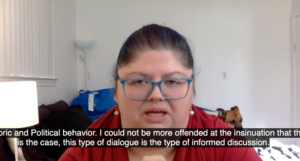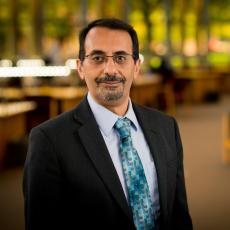By Jan Worth-Nelson
University of Michigan – Flint Chancellor Deba Dutta offered no news or comments about the downtown Flint campus’s “Strategic Transformation” process in his 3:50 minute presentation to the University of Michigan Regents at their regular monthly meeting in Ann Arbor Thursday.
Some observers had predicted the Regents’ meeting might have been a time when something concrete about plans for UM – Flint would be revealed. A process begun last September to try to find solutions to a batch of pressing problems has continued beyond its initial timeline.
In a series of “people’s town halls” organized outside official channels, a group of faculty, staff, students, and alumni have attempted to offer concerns and suggestions but have complained that upper management has not been transparent about what is being considered. They say they fear decisions have already been made behind closed doors.
Though Dutta did not give anything away, three others spoke up during public comments at the end of the meeting — two critiquing the process, and one thanking Strategic Transformation consultants, the Huron Consulting Group, for helping his department assemble needed data.
A lot is at stake for the regional branch of the University of Michigan, which started in 1956 in a few trailers on a muddy parcel of what is now Mott Community College and now employs more than 1,000 in a half dozen large downtown buildings.
The university is wrestling with a $7.3 million deficit and enrollment plunging to under 6,000 — a drop of 30 percent over the past few years — along with what administrators call an “unacceptable” six-year graduation rate of 35 percent. Finally, in some cases, a decline in demand for humanities courses has plagued upper division class enrollments and imperiled some degree programs.
“We all agree that we are at in inflection point in Flint, and I want to be clear: we support some sort of transformation,” Kim Saks, assistant professor of political science, declared.

UMF Assistant Professor of Political Science, Kimberly Saks. (Photo source: screenshot from virtual meeting.)
“However, Huron’s analysis has major flaws in it,” Saks asserted. . “UM – Flint isn’t suffering enrollment declines because it lacks relevant programs. UM – Flint lacks necessary resources in admissions, student support, campus facilities and more.
“Starting new programs or ending old ones will not solve these problems,” she said, “But the Strategic Transformation is now being used as an excuse to shuffle disciplines and departments without proper analysis or faculty governance.
“This is destabilizing and will deter quality students from attending. We are already losing faculty who feel confused and undervalued.
“This is not a sustainable transformation,” she said.
Recent moves of the math department and a group of natural sciences departments from the College of Arts and Science (CAS) into the new College of Innovation and Technology (CIT) , for example, came as a surprise to many on the faculty, who were presented with the decision as a fait accompli at a recent faculty council meeting, sources said.

The new College of Innovation and Technology (CIT) that will be built on the northwest side of the Flint campus near the White Building. (Photo from UM-Flint website)
“The people of Flint and the students of UMF past, present and future deserve to know that their institution is in good hands. ITAC, students government, faculty council “have all rung the alarms,” Saks said.
Saks concluded with “three asks” of the Regents:
- Pause any discipline or college transfers until a review of governance process can be undertaken by President Ono or his designee,
- Mandate Huron publish their data and methods in full, post haste, before decisions are made.
- Require that funding be distributed equitably among new and existing programs.
Political Science major Jacquindre Brown, who’s also a representative in student government, focused his comments on the Huron Consulting group.
“When it comes to the Strategic Transformation process itself, there have been avenues to contact Chancellor Dutta,” Brown said. “I appreciate that, because I believe communication is key to the health of the campus.
“However, the same can not be said for the group that is leading the charge for Strategic Transformation.”
Brown noted the Huron Consulting Group is known for “having analyses resulting in cuts for departments and firing of staff and faculty, and I do not want the same to happen here.”
“As it turns out,” Brown continued, “the assumed malicious intent [behind Huron’s influence] soon became recognized as incompetency. I say this because the group filed their second report which didn’t specify any of the data and had known errors like putting departments in their analyses that haven’t been around for almost three years, such as African Studies.
“I am speaking to you all to question why are we, as one of the most critically acclaimed universities in the world, why are we relying on a group that can’t even get their facts right?
“We are Wolverines, we lead, we don’t follow incompetency. We can get things done — and not rely on a group that has been lackluster to say the best.”
One final speaker, however, had something positive to say.
Reza Amini, associate professor of public health in the School of public health, said as his department aimed to develop its programs, “We needed more help gathering external data regarding market changes and community needs.

Reza Amini, associate professor of public health in the School of public health. (Photo source: UM-Flint website)
“With the support of the Huron Group, the transformation planning process allows us to access those data and incorporate them into reviewing current programs and developing new programs at the undergrad and grad level.
“Since August, we have reviewed the proposals for the new programs with high market demands and which address workforce shortages in local hospitals at Michigan medicine and across the state and revise programs
“As a result of this collaboration, faculty in the college of Health sciences have been actively engaged in the transformation process for our unit,” Amini said. “They are excited to support the proposals being put forward by our college.
“Many faculty on our campus strongly support this transformation process,” he asserted, “which offers opportunities for students to gain education in a high demand field and to help address critical workforce needs of our state and beyond
Amini thanked the Regents and President Ono for the opportunity to “allow UM – Flint to continue its essential role in Genesee County, Michigan, nationally and internationally.”
A town hall open to the public is scheduled for 10 to 11:30 a.m. Friday morning in the Riverfront Center on the UM – Flint campus.
EVM Consulting Editor Jan Worth-Nelson can be reached at janworth1118@gmail.com.



You must be logged in to post a comment.